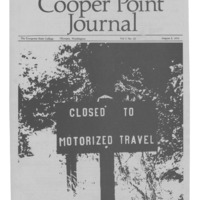The Cooper Point Journal Vol. 2, No. 33 (August 8, 1974)
Item
- Identifier
- Title
- Date
- Evergreen Subject
- Description
- Creator
- Contributor
- Extent
-
Eng
cpj0057.pdf
-
Eng
The Cooper Point Journal Vol. 2, No. 33 (August 8, 1974)
-
August 8, 1974
-
Student Organizing and Activism
-
Evergreen Organic Farm
-
Environmental Studies
-
Eng
Page 1: Cooper Point Journal (front page) --Closed to Motorized Travel (image);
Page 2: (advertisement) Evergreen State College Bookstore;
Page 2: Table of Contents;
Page 2: Staff Credits;
Page 3: Times At Evergreen State College: Moths, TV, Cyprus;
Page 3: Times At Evergreen State College: Search for Inspiration;
Page 3: (advertisement) Colony Inn;
Page 4: (photograph) [boy with shirt off while the rest of the kids have theirs on];
Page 4-5: Letters: DTF working;
Page 5: Letters: Talk needed ;
Page 5: Letters: Bus requested;
Page 5: (advertisement) Raudenbush Motor Supply;
Page 5: (advertisement) Word of Mouth Books;
Page 6: Campus News in Brief: Bake sale held for legal fees;
Page 6: Image: Nanette Westerman (by Allison);
Page 6: Campus News in Brief: Library Announces;
Page 6: Campus News in Brief: DTF posts hours;
Page 6: Campus News in Brief: Volunteers needed;
Page 6-7: Campus News in Brief: Bank withdraws from student loan program;
Page 7: Campus News in Brief: Drive continues;
Page 7: Campus News in Brief: Organic Farming workshops given;
Page 7: Campus News in Brief: 'Ted' sighted at Evergreen;
Page 7: Campus News in Brief: Justice grant received;
Page 8-9 & 13: Alpine Lakes in Tug-of-War;
Page 9: Image: Martha Bean;
Page 10: American Perspectives: Power and Diplomacy;
Page 11: European Media Review: Scandinavia;
Page 12: Housing Rates Increase;
Page 12: Image: Ken Jacob (by Hirshman);
Page 12: Rate comparison table-housing rental rates-1973-75 with image of dorm (by Hirshman);
Page 13: (advertisement) Vino Fino;
Page 13: (advertisement) Red Apple Natural Foods;
Page 13: (advertisement) Sunrise Mountaineering;
Page 13: (advertisement) Rainy Day Record Co.;
Page 14: Books: Two studies of sexism;
Page 14: (cartoon) "Nothin's too good for our boys..." (well endowed stewardess on a military plane);
Page 14: (advertisement) SAGA [Food Services];
Page 15: Northwest Culture;
Page 15: (advertisement) Dirty Dave's Gay 90's;
-
Eng
Graham, Tom
-
Eng
Sundahl, Jay
-
Eng
Moore, Art
-
Eng
Hancock, Sally
-
Eng
Allison, Nicholas H.
-
Eng
Vachuda, Jaroslav
-
Eng
Berger, Knute Olsson H.G.S.
-
Eng
Shore, Stan
-
Eng
Foster, John
-
Eng
Posthumus, Ingrid
-
Eng
Allison, Nicholas H.
-
Eng
Dashe, Andrea
-
Eng
Katz, Dean
-
Eng
Hucks, Dianne
-
Eng
Kramer, Wendy
-
Eng
Hirshman, William P.
-
Eng
Ryan, Andy
-
Eng
Graham, Tom
-
Eng
Wallick, Len
-
Eng
Frankel, Rosalie
-
Eng
Lenon, Thomas R.
-
Eng
16 pages
- Media
 cpj0057.pdf
cpj0057.pdf
Position: 1142 (3 views)